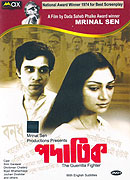
Arvostelut (1)
A film from the times when it still made sense to fight for something and people still read newspapers - the world of newspapers, and their aesthetics, their modus operandi, are assumed by the director for his film, which then gains a sometimes formally experimental approach comparable to other leading filmmakers of the "third world" at that time, such as Glauber Rocha and Tomás Gutiérrez Alea: a newspaper press spewing out an unrelenting succession of headlines, thereby imitating the cold relentlessness of history before which the main protagonist is forced to act, is doubled by the powerlessness of every newspaper reader against events they cannot influence. Similarly, the main character is effectively immobilized within the confines of a conspiratorial apartment and compelled to observe how the course of history unfolds outside his window, his prison - a prison of his own making? Because Mrinal Sen is an already seasoned director of that "third world," one who has clearly taken inspiration from European artistic productions of the time (not only), not just in terms of formal avant-garde techniques (sharp cuts combining seemingly unrelated realities reminiscent not only of the logic of often illogical juxtaposition of newspaper articles but also of the Eisensteinian-Godardian school), but also in tone, which was shaped by the disillusionments of European intellectuals and their films following their unsuccessful revolutions: thus, the inspiration from the disillusionment of European intellectuals and their films, who, starting from the 70s, detached themselves from political rebellion and allowed their characters to wander through an existential labyrinth of the world and history, which progress at a different tempo and in a different direction than the characters themselves (e.g. Bellocchio, Bertolucci). The Guerilla Fighter is still deeply rooted in the reality of the country, which, in a typically late 60s approach, allows fiction to be estranged through documentary methods, presenting the magnificent and rarely seen genre of political existentialism.
()